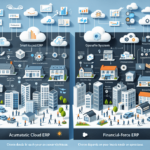FinancialForce ERP vs NetSuite ERP: Comprehensive Comparison for 2024
Selecting the right enterprise resource planning (ERP) system is a pivotal decision that can significantly impact your business's efficiency and growth. FinancialForce ERP and NetSuite ERP are two of the most prominent cloud-based ERP solutions available today. While both offer robust functionalities, each has its distinct advantages tailored to different business needs. This article delves into an in-depth comparison of FinancialForce ERP and NetSuite ERP, focusing on key features, benefits, costs, implementation, scalability, customization options, user interface, customer support, third-party integrations, reporting and analytics, security, and future upgrade prospects to help you make an informed decision.
Understanding Enterprise Resource Planning (ERP) Systems
ERP systems are integral to modern businesses, serving as centralized platforms that integrate various core processes such as accounting, finance, human resources, inventory, supply chain management, and customer relationship management. By consolidating data across departments, ERPs enhance communication, streamline operations, and boost overall efficiency. Advanced reporting and analytics capabilities within ERPs empower businesses to make data-driven decisions, thereby improving their performance and competitiveness.
According to a Gartner report, the global ERP software market is projected to grow by 6.0% in 2024, highlighting the increasing reliance on these systems to drive business success.
Implementing an ERP system involves significant planning, training, and maintenance. It is crucial for businesses to assess their specific needs to choose an ERP solution that is scalable, flexible, and customizable to ensure long-term benefits and return on investment (ROI).
FinancialForce ERP: Key Features and Advantages
FinancialForce ERP is a cloud-based ERP solution built on the Salesforce platform, offering a suite of financial management applications. Key features include:
- General Ledger: Comprehensive financial accounting capabilities.
- Accounts Payable and Receivable: Efficient management of incoming and outgoing payments.
- Tax Management: Automated tax calculation and compliance.
- Billing: Streamlined invoicing processes.
- Revenue Recognition: Compliance with accounting standards for revenue reporting.
- Project Management: Tools for resource allocation, time tracking, task management, and project accounting.
One of FinancialForce ERP's standout advantages is its seamless integration with Salesforce CRM, enabling businesses to unify financial and customer data on a single platform. This integration enhances data accuracy and provides real-time insights into financial performance.
FinancialForce ERP is highly scalable, making it suitable for growing businesses that require flexibility in adding new users and functionalities. Its intuitive user interface, featuring customizable dashboards and reports, ensures that users can easily navigate the system and access critical financial data without extensive training.
NetSuite ERP: Key Features and Advantages
NetSuite ERP is a comprehensive cloud-based ERP solution that caters to businesses of all sizes. Its key functionalities include:
- Financial Management: Robust tools for managing finances, budgeting, and forecasting.
- Order Management: Efficient handling of customer orders and fulfillment.
- Inventory Management: Advanced tracking and optimization of inventory levels.
- Supply Chain Management: Streamlined operations from procurement to delivery.
- Customer Relationship Management (CRM): Integrated tools for managing customer interactions.
- E-Commerce: Built-in e-commerce capabilities for online sales.
NetSuite ERP offers a customizable dashboard that provides real-time insights into key performance indicators (KPIs), supporting multiple languages, currencies, and subsidiaries. Its ability to integrate with various third-party applications, including Salesforce CRM and major e-commerce platforms, ensures a seamless flow of data across different business functions.
A notable benefit of NetSuite ERP is its robust security framework, which includes role-based access control, data encryption, and regular security updates. These features safeguard sensitive business information against unauthorized access and cyber threats.
Comparative Analysis: FinancialForce ERP vs NetSuite ERP
Cost Comparison
Both FinancialForce ERP and NetSuite ERP offer subscription-based pricing models, typically calculated on a per-user, per-month basis. However, the total cost can vary based on the selected modules and business requirements.
- FinancialForce ERP: Pricing is modular, allowing businesses to select only the necessary applications, which can result in cost savings for specific needs.
- NetSuite ERP: Offers tiered pricing plans, ranging from basic to enterprise-level packages, providing flexibility for different budget sizes.
According to Software Advice, NetSuite ERP pricing generally starts at around $999 per month, whereas FinancialForce's pricing is more customizable based on the modules selected. Businesses should conduct a thorough cost-benefit analysis to determine which ERP offers better value for their specific needs.
Ease of Implementation and Integration
Implementing an ERP system requires careful planning and execution. Both FinancialForce ERP and NetSuite ERP are cloud-based, facilitating easier deployment and accessibility.
- FinancialForce ERP: Benefits from its seamless integration with Salesforce CRM, providing a unified platform for financial and customer data management.
- NetSuite ERP: Offers extensive integrations with various third-party applications, enhancing overall business process efficiency.
According to a Forrester report, both ERPs score highly in terms of integration capabilities, with NetSuite having a slight edge due to its broader range of native integrations.
Scalability and Customization Options
As businesses evolve, their ERP systems must scale accordingly. Both FinancialForce ERP and NetSuite ERP offer extensive customization options to accommodate changing business needs.
- FinancialForce ERP: Highly customizable with options to add or modify modules, workflows, and reports, ensuring the system adapts to unique business processes.
- NetSuite ERP: Provides a wide range of customization features, including SuiteApps, which are third-party applications that extend NetSuite's functionality.
NetSuite's SuiteCloud platform allows for significant customization, enabling businesses to tailor the system without extensive technical expertise, as highlighted in their product overview.
User Interface and User Experience
A user-friendly interface is essential for ensuring high adoption rates and productivity. Both ERPs prioritize intuitive design and ease of use.
- FinancialForce ERP: Features customizable dashboards and real-time reporting tools that enhance user experience and facilitate informed decision-making.
- NetSuite ERP: Offers a highly customizable dashboard with drag-and-drop widgets, providing users with personalized views of their KPIs and metrics.
User satisfaction surveys indicate that both ERPs receive positive feedback for their interfaces, though some users prefer NetSuite's more extensive customization capabilities as reported by Capterra reviews.
Customer Support Services
Effective customer support is critical for resolving issues and ensuring smooth ERP operations.
- FinancialForce ERP: Provides support through phone, email, and chat, along with comprehensive online resources, including documentation and knowledge bases. Additionally, they offer training and certification programs to ensure users are well-versed in the software.
- NetSuite ERP: Offers multi-channel support, including phone, email, and live chat, backed by a dedicated support team. NetSuite also provides extensive online resources and a customer support portal for self-service assistance.
According to Software Advice, NetSuite ERP is often praised for its responsive and knowledgeable support staff, while FinancialForce ERP is recognized for its comprehensive training resources.
Integration with Third-Party Applications
Seamless integration with other business applications is essential for maximizing ERP utility.
- FinancialForce ERP: Integrates seamlessly with Salesforce CRM, allowing businesses to manage financial and customer data from a single platform. Additionally, it supports integrations with various third-party applications to enhance functionality.
- NetSuite ERP: Offers extensive integrations with a wide range of third-party applications, including e-commerce platforms, payment gateways, and other business software solutions. This ensures a smooth flow of data across different departments and systems.
Both ERPs support robust integration frameworks, but NetSuite's extensive SuiteApp marketplace provides a broader selection of ready-to-use integrations, as detailed on their SuiteApp page.
Reporting and Analytics Capabilities
Advanced reporting and analytics are vital for strategic decision-making and performance monitoring.
- FinancialForce ERP: Offers extensive reporting and analytics tools that enable businesses to generate custom reports, analyze data trends, and gain real-time insights into financial performance. The platform supports advanced analytics through integration with Salesforce Einstein Analytics.
- NetSuite ERP: Provides powerful reporting and analytics features, including customizable dashboards that display real-time data on key metrics and KPIs. NetSuite's SuiteAnalytics offers built-in analytical tools for deeper data exploration and visualization.
According to Gartner, both ERP solutions offer robust analytics capabilities, with NetSuite slightly ahead due to its integrated SuiteAnalytics feature.
Security Features
Data security is a paramount concern for businesses leveraging ERP systems. Both FinancialForce ERP and NetSuite ERP implement advanced security measures to protect sensitive information.
- FinancialForce ERP: Utilizes industry-standard encryption protocols and robust access controls to ensure data security. The platform complies with data protection regulations such as GDPR, HIPAA, and SOC 2, providing businesses with assurance of data integrity and confidentiality.
- NetSuite ERP: Offers comprehensive security features, including role-based access controls, two-factor authentication, and data encryption. NetSuite also adheres to strict compliance standards like GDPR, HIPAA, and SOC 2, ensuring that business data remains secure against unauthorized access and cyber threats.
Both systems are designed to meet stringent security requirements, making them suitable for businesses in regulated industries.
Prospects for Future Upgrades
Staying current with technological advancements is essential for maintaining ERP system efficacy.
- FinancialForce ERP: Regularly releases software updates and upgrades to enhance functionality and integrate new features based on user feedback. They also host a community forum where users can suggest and discuss future enhancements.
- NetSuite ERP: Provides consistent software updates and upgrades, ensuring access to the latest features and security enhancements. NetSuite also offers a dedicated customer support team to assist with any upgrade-related queries or issues.
Both ERP providers prioritize continuous improvement, ensuring that their systems evolve with emerging business needs and technological trends.
Conclusion: Choosing the Right ERP for Your Business
Deciding between FinancialForce ERP and NetSuite ERP depends on your business's unique requirements, budget, and long-term goals. Both ERPs offer comprehensive features and robust support, but they cater to different aspects of business operations.
FinancialForce ERP is ideal for businesses deeply integrated with Salesforce CRM, seeking a highly customizable and scalable financial management solution. Its user-friendly interface and seamless Salesforce integration make it a strong contender for companies prioritizing financial operations.
NetSuite ERP, on the other hand, offers a broader range of functionalities suitable for businesses of all sizes, especially those requiring extensive third-party integrations and advanced analytics capabilities. Its comprehensive feature set and strong security measures make it a versatile choice for diverse industries.
To determine the best fit for your organization, consider evaluating the following factors:
- Core functionalities and feature sets
- Pricing and overall cost-effectiveness
- Ease of implementation and integration with existing systems
- Scalability and customization options
- User interface and overall user experience
- Customer support and training resources
- Third-party integration capabilities
- Reporting and analytics tools
- Security features and compliance standards
- Future upgrade prospects and vendor support
By conducting a thorough comparison based on these criteria, your business can make an informed decision to select the ERP system that best aligns with your operational needs and strategic objectives.




















